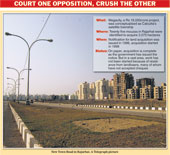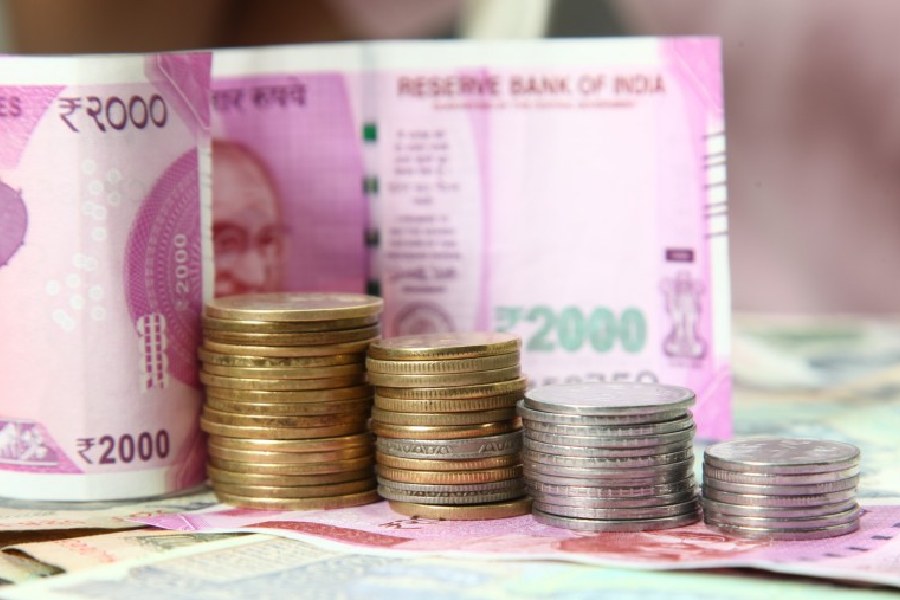 |
One morning in the summer of 2008 Asharf Molla woke up and saw the irrigation department water pump, the only source of water for his 1.5-bigha plot, was not working. When he started asking around, the middle-aged farmer learnt that all the four pumps in Baliguri village, barely 3km from Salt Lake, were out of order.
It was peak paddy sowing season and round-the-clock availability of water was a must. So Ashraf and other villagers headed straight for the irrigation department office seeking immediate help to fix the snag. But for days and weeks and months, no help came. Only the sowing season came and went.
“We all knew why water supply to our plots was snapped. We had refused to give up our land for industrial development and so we had to pay a heavy price,” said the resident of Baliguri village in Patharghata mouza, under Rajarhat panchayat.
Housing minister Goutam Deb’s recent reiteration — in the wake of the Vedic Village flare-up — that the land acquisition for Rajarhat Megacity was a model of “peaceful and successful” land transfer has rubbed salt into the wounds of the likes of Ashraf.
Ashraf’s plot had been earmarked for land acquisition by Hidco for Rajarhat Megacity. The state government body — chaired by Deb — entrusted with the task of developing the township had requisitioned 3,075 hectares spread over 25 mouzas.
The project was conceived between 1994 and 1995 with former chief minister Jyoti Basu laying the foundation stone for the Rs 18,000crore project (according to cost calculations in the mid-Nineties).
Land acquisition notification, according to the 1894 Land Acquisition Act, was issued in 1996 and after several rounds of hearings on compensation, the agency started acquiring land from 1998.
Ashraf and several other villagers in mouzas like Chabna, Jatragachhi and Kadampur tried to resist the acquisition drive. In a bid to save their land, they approached local leaders of all hues — the CPM, Congress, Trinamul and the BJP. “But nobody cared to listen to our pleas. Instead, the local administration ensured that we were forced to sell our land,” said Ashraf.
The father of two sons finally decided to give up and accepted a little over Rs 2.6 lakh from Hidco. Feeding the family without a proper harvest was not possible.
There are, however, several others — Raju Mollah of Baliguri, Nitish Mondal of Patharghata and Lakshmi Ratan Roy of Bajetaraf — in hutments behind the highrises, who have refused to accept the compensation from Hidco. According to rough estimates, cheques worth “a few crores” had to be deposited with the courts with the beneficiaries refusing to accept them.
“All the political parties conspired to uproot them from their land. They tried to take away their livelihood by snapping water supply. In several parts of Rajarhat, the local bodies, which are responsible for converting low-lying land to cultivable land, sat idle and farmers were left with no option but to sell their plots,” Nilotpal Dutta, a former CPM functionary, told Metro.
Aggrieved with his party’s indifference to the plight of farmers, Dutta went on to form Rajarhat Jomi Bachao Committee — billed as the first such forum of farmers here — in the mid-Nineties.
According to him, all political parties were partners in a big land-grab game. Trinamul’s former MLA of Rajarhat, Tanmoy Mondal, was a member of the land procurement committee, formed in late-Nineties to facilitate land acquisition in Rajarhat.
“Deb got almost all the opposition leaders to his side and so there was nobody to fight for the farmers. That’s why he can afford to call it a successful model,” said Dutta, recounting how others had copied Deb’s “inclusive” strategy in what many refer to as the “rape of Rajarhat”.
“When the Bhangar-Rajarhat Development Authority (Brada) started acquiring land, they got Trinamul’s Arabul Islam, MLA from Bhangar, into a similar committee. The opposition leaders were also able to appoint their men in the suppliers’ syndicates,” added Dutta.
With the opposition won over, it was easy for the Rajarhat land acquisition machinery to silence the dissenting voices of the villagers.
Raju Molla, a farmer in Baliguri village of Patharghata mouza, recounted an incident from September 2008, which he will “not even forget” in his grave.
“A huge contingent of cops arrived in our village along with hundreds of armed people wearing red armbands. Then, at least 50 lorries entered the village and dumped rubbish on full-grown mustard crop. The year’s produce was lost and those living off the land had no option but to accept the compensation,” said Raju, who is ploughing a lone furrow by not accepting compensation.
“If this is what is called peaceful land acquisition, I shudder to think what these people can do to grab land forcefully,” added Raju, who has lost his livelihood but is living in the hope of getting back his land some day.










